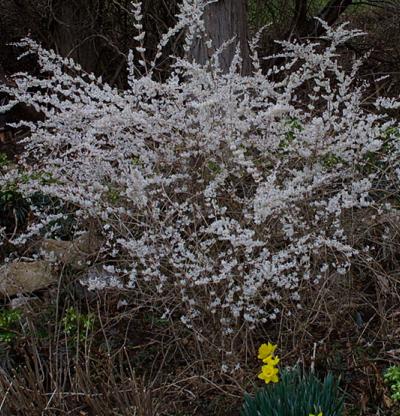





 White forsythia (Abeliophyllum distichum)
ah-bee-lee-oh-FIL-lum DISS-tih-kum
Synonyms:
Korean abelialeaf
Genus:
Abeliophyllum
This deciduous shrub is related to the forsythia, but differs in that it has white (rather than yellow) flowers that open in early spring before true forsythia. It is a member of the olive family (Oleaceae). In early spring, before the new leaves form, purplish buds all along the grey naked branches open into small white four-petaled, almond-scented flowers with yellow stamens. After flowering, green, glossy abelia-like leaves appear.
Noteworthy Characteristics:
White forsythia is native to a small area of central Korea. It is seriously endangered in the wild as it is regarded as a medicinal plant with properties similar to witch hazel, and is illegally harvested for the black market trade in Korea. It is widely grown as a cultivated garden plant, however, so there is no risk of extinction other than in the wild.
Care:
White forsythia likes full sun but will tolerate some shade. It is not fussy about soil conditions but will do poorly in drought-like conditions. In the coldest areas, it is best to either protect the plant from dessicating winter winds, or grow it close to a wall for extra warmth. Prune after it flowers to encourage new wood for next year's flowers. As much as one-third of the shrub may be removed annually. A hard prune every three to four years will control twigginess. Its branches can be cut and brought inside in early spring for forcing in vases.
Propagation:
Root greenwood or semi-ripe cuttings in summer; layer in summer.
Problems:
Infrequent.
White forsythia (Abeliophyllum distichum)
ah-bee-lee-oh-FIL-lum DISS-tih-kum
Synonyms:
Korean abelialeaf
Genus:
Abeliophyllum
This deciduous shrub is related to the forsythia, but differs in that it has white (rather than yellow) flowers that open in early spring before true forsythia. It is a member of the olive family (Oleaceae). In early spring, before the new leaves form, purplish buds all along the grey naked branches open into small white four-petaled, almond-scented flowers with yellow stamens. After flowering, green, glossy abelia-like leaves appear.
Noteworthy Characteristics:
White forsythia is native to a small area of central Korea. It is seriously endangered in the wild as it is regarded as a medicinal plant with properties similar to witch hazel, and is illegally harvested for the black market trade in Korea. It is widely grown as a cultivated garden plant, however, so there is no risk of extinction other than in the wild.
Care:
White forsythia likes full sun but will tolerate some shade. It is not fussy about soil conditions but will do poorly in drought-like conditions. In the coldest areas, it is best to either protect the plant from dessicating winter winds, or grow it close to a wall for extra warmth. Prune after it flowers to encourage new wood for next year's flowers. As much as one-third of the shrub may be removed annually. A hard prune every three to four years will control twigginess. Its branches can be cut and brought inside in early spring for forcing in vases.
Propagation:
Root greenwood or semi-ripe cuttings in summer; layer in summer.
Problems:
Infrequent.
Copyright © www.100flowers.win Botanic Garden All Rights Reserved